On World Hijab Day (February 1st), it’s crucial to reflect on the significance of the hijab and the challenges Muslim women face due to hijab bans and Islamophobia. These laws and attitudes undermine religious freedom and perpetuate discrimination, affecting communities worldwide. Islamophobia has been steadily increasing across the globe, creating a hostile environment for Muslim communities. This prejudice manifests in hate crimes, biased media narratives, and exclusionary laws targeting Islamic practices. Among these, restrictions on wearing the hijab stand out as an egregious infringement on religious freedom. These laws, often justified under the guise of secularism or national unity, perpetuate discrimination and alienation, particularly for Muslim women. By acknowledging the cultural and personal value of the hijab, we can foster a more inclusive understanding that respects individual religious choices.
Islamophobia and the Hijab Debate
What Is Islamophobia?
Islamophobia refers to the irrational fear, hatred, or prejudice against Muslims and Islam. In recent years, Islamophobia has grown significantly, especially after high-profile terrorist attacks and the rise of far-right populism. This prejudice often manifests in discriminatory laws and practices targeting Muslim communities, particularly Muslim women who wear the hijab. These narratives disproportionately target Muslim women who wear the hijab, portraying them as either oppressed victims or threats to national values.
Hijab Bans And Islamophobia
Hijab bans symbolize the broader issue of Islamophobia, undermining religious freedoms and marginalizing Muslim women. In Western countries, the hijab is frequently framed as a symbol of oppression and patriarchy. Many argue that women who wear the hijab are oppressed by Islamic cultural norms and religious mandates. This narrative overlooks the fact that many women choose to wear the hijab as a form of personal expression and religious devotion. By focusing on the hijab as a symbol of oppression, these societies ignore the agency and autonomy of Muslim women.
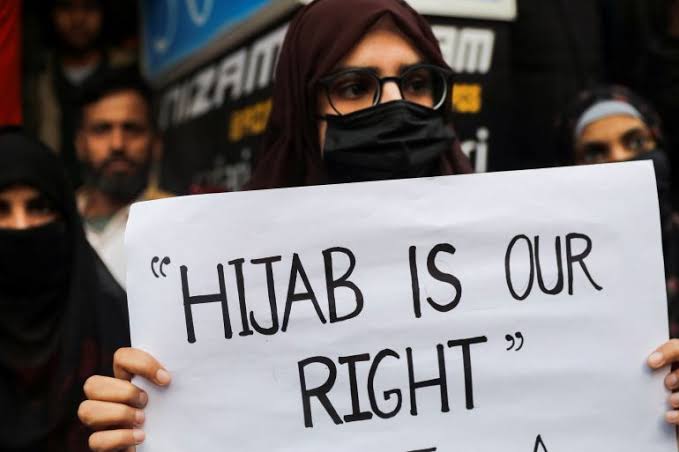
Secular bans under “equality” claims deny choice, deepening discrimination. These policies ignore agency, reinforcing stereotypes instead of protecting rights.
Hijab Bans and the Global Crackdown on Muslim Identity
The hijab debate also brings attention to the double standard surrounding women’s autonomy. Several countries have implemented full or partial bans on the hijab or niqab in public spaces, citing reasons such as secularism, security, or national identity. These bans reflect growing Islamophobia
Hijab Restrictions in Various Countries
- France, a pioneer in such legislation, enforced a full-face veil ban in 2011 under its strict laïcité (secularism) principles. France’s hijab ban extends to workplaces, sports, and public spaces. Paris 2024 Olympics and sports federations has banned hijabi athletes. Macron claims Islam is in crisis and enforces stricter laws, including the 2021 Separatism Bill targeting Muslim practices.
- Belgium followed with a similar niqab ban in 2011, arguing that face coverings obstruct social interaction.
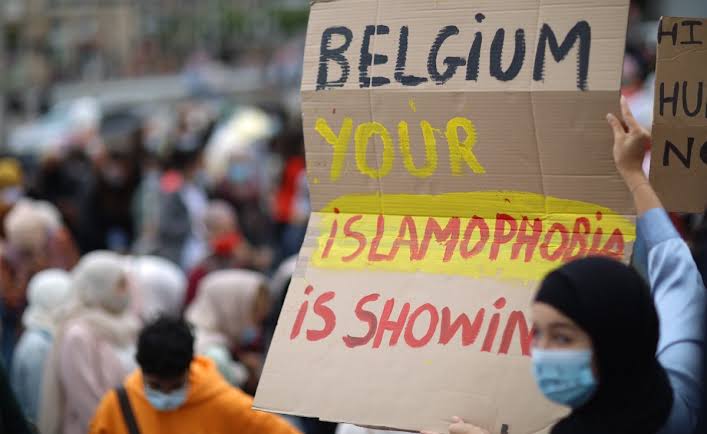
- Switzerland passed a nationwide ban on full-face coverings in 2021, after a public referendum.
- The Netherlands introduced a partial ban in 2019, restricting face veils in public buildings, transport, and schools.
- Austria enacted a full-face veil ban in 2017, extending restrictions to the hijab for schoolgirls under 10 in 2019.
- Bulgaria also banned the niqab in 2016, citing security concerns.
- India’s Karnataka state sparked controversy in 2022 by barring hijabs in schools, framed as upholding uniformity but criticized as targeting Muslim minorities amid rising Hindu nationalism.
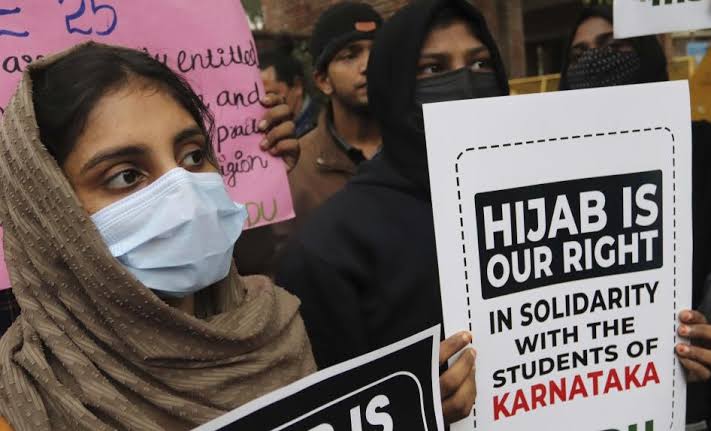
- Sri Lanka imposed a temporary face-covering ban in 2019 following the Easter bombings, citing security concerns.
- Tajikistan: In 2024, Tajikistan implemented a complete ban on the hijab, citing national identity preservation. This law forced many Muslim women to choose between their faith and public life.

These laws, primarily targeting Muslim women, expose the hypocrisy of so-called democratic societies. If these countries truly support freedom and equality, they would allow women to choose whether or not to wear the hijab without fear of legal consequences.
Government Responses to Islamophobia
Islamophobia has been a growing issue worldwide, particularly in the wake of terrorist attacks and political tensions. Governments around the world have responded to the rise of Islamophobia in various ways, some acknowledging the problem and others perpetuating it.
France has implemented strict secular laws, while the U.S. has seen a rise in anti-Muslim sentiment post-9/11. Germany and the UK have taken steps toward integration but face challenges from far-right movements. Australia has also struggled with Islamophobia, particularly after the Christchurch mosque shootings.
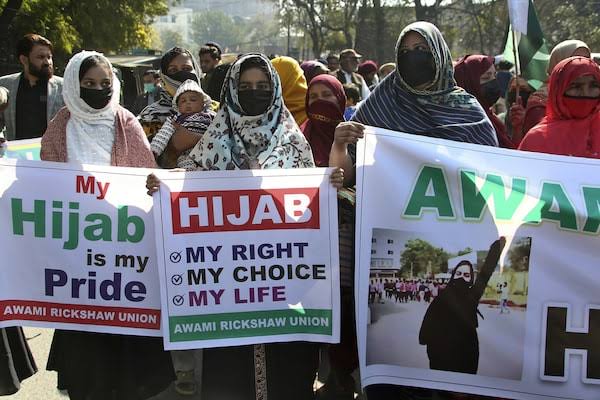
Impact of Hijab Laws on Communities
Islamophobia and hijab bans undermine fundamental freedoms and the right to individual expression. Addressing these challenges requires immediate action to ensure equality and justice for Muslim communities worldwide. There are several impacts of Hijab Laws on communities, like;
• Mental Health and Identity
Hijab bans severely impact Muslim women’s mental health and sense of identity. For many, the hijab represents faith, modesty, and self-expression. Being forced to remove it leads to feelings of humiliation, anxiety, and loss of autonomy. In schools, Muslim girls face bullying and exclusion, which hinders their academic progress and confidence.
• Professional and Social Exclusion
Discrimination extends to the workplace, where hijab-wearing women are often overlooked for jobs or promotions. Employers perceive them as incompatible with professional settings, limiting their career growth and financial independence. Socially, hijab bans reinforce stereotypes, portraying Muslim women as oppressed or incompatible with modern values.
• Erosion of Religious Freedom
By targeting Muslim attire, governments infringe on religious freedom, a fundamental human right. These laws create a two-tiered citizenship, where Muslims face greater scrutiny and fewer rights. Such measures fracture societies, fostering mistrust and division among communities.
Global Resistance Against Hijab Bans
Despite the challenges, Muslim women and activists continue to resist these discriminatory laws. Protests in France, India, and Denmark highlight the resilience of Muslim communities. Social media campaigns, such as #HandsOffMyHijab, amplify their voices and demand global attention. Organizations like the United Nations have criticized hijab bans, labeling them disproportionate and discriminatory.
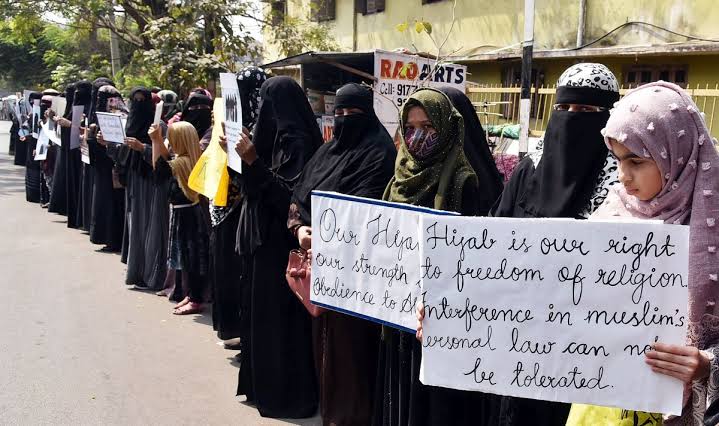
Muslim Women Redefining Strength & Resistance
Despite the oppressive forces at play, the hijab has become a powerful symbol of resistance. Many Muslim women proudly wear the hijab, not as a symbol of oppression, but as an expression of personal choice and identity. The hijab is a statement of faith, modesty, and empowerment. For these women, wearing the hijab is a means of asserting autonomy over their bodies and challenging societal norms that seek to control them.
- Figures like Ilhan Omar, the first hijab-wearing Congresswoman in the United States, have used their visibility to advocate for human rights, immigration reform, and social justice.
- Ibtihaj Muhammad, the first hijab-wearing U.S. Olympian, defied barriers in the world of sports and inspired the creation of the first hijab-wearing Barbie.
- Halima Aden, a trailblazer in the fashion industry, broke stereotypes by wearing the hijab on international runways, proving that modesty does not limit a woman’s success.
- Malala Yousafzai (United Kingdom), the Youngest Nobel Peace Prize winner, often wears hijab as a symbol of modesty & identity.
- Noor Tagouri, one of the first hijabi news anchors in the United States.
- Amira Elghawaby, the first-ever Special Representative on Combatting Islamophobia in Canada.
These women have broken barriers, proving that the hijab is not an obstacle but a symbol of empowerment and identity.
Policy Recommendations
To address these issues,
- Governments must prioritize policies that protect religious freedoms and combat Islamophobia.
- Hijab bans and similar discriminatory laws should be repealed to protect the rights of Muslim communities and to uphold fundamental human rights.
- Policymakers must engage with Muslim voices to understand their concerns and craft equitable solutions.
- Educational initiatives promoting cultural awareness can help dismantle stereotypes.
- The international community must hold governments accountable for discriminatory practices and human rights violations.
The international community also must demand equal rights for Muslim women, whether in the West or Muslim-majority countries.
Path Forward
The hijab symbolizes faith, identity, and personal choice. Islamophobia and hijab bans violate the rights of Muslim women. These laws harm individual autonomy and fracture communities. Muslim women resist oppression by proudly wearing the hijab. Governments must protect religious freedoms and engage with Muslim voices. The international community must hold nations accountable for discrimination. How can we foster a more inclusive society that respects and celebrates diverse expressions of identity?
Related Stories:
Iran enforces new hijab law with death penalty for women who refuse to comply
Iran Announces to Open ‘Treatment Clinic’ for Women Defying Hijab Laws
















